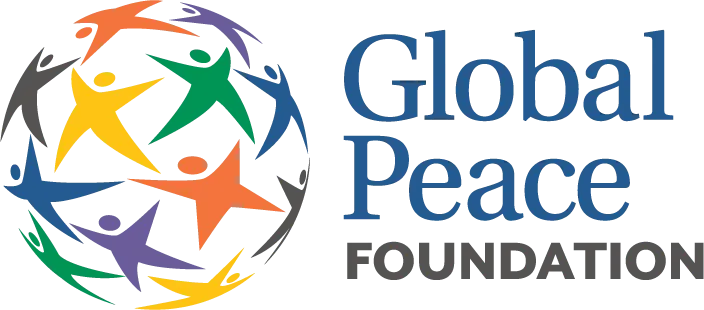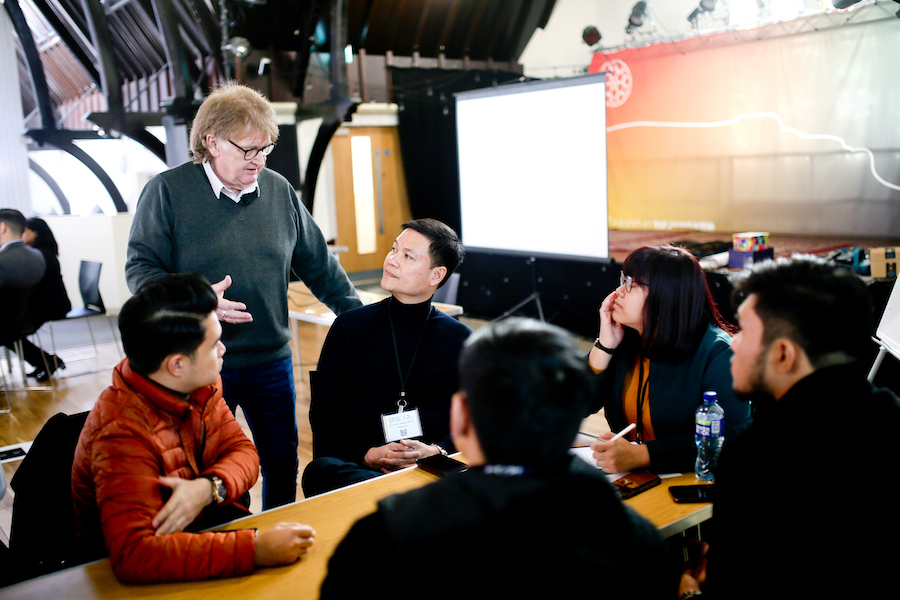
Delegates from around the world participate in the third day of the Peace Learning Program in Belfast /Photo by Paul Moane
How do post-conflict communities deal with past hurt, resentment, and inherited intergenerational prejudice?
What role can social media play in preventing mobilization of individuals vulnerable to the indoctrination of extreme radicalization?
What universal shared values can communities of different (and seemingly conflicting) beliefs use to establish and maintain peaceful coexistence?
These and other questions were discussed and analyzed by international delegates from Kenya, the United States, Nigeria, Uganda, and the Philippines during the third day of the Peace Learning Program in Belfast, Northern Ireland held on February 26. The active training alternated between presentations by experienced leaders at the front of the room followed by engaging group work.
The presentations that took place were facilitated by Global Peace Foundation’s Cat Lockman (Director of Organizational Development), and Dr. Nilufar Choudry (Senior Advisor, Partnerships and Development), and Dr. Talib Shareef, President and Imam of the Masjid Muhammad, who concluded by sharing about the AMATE (American Muslims Against Terrorist Extremism) Initiative.
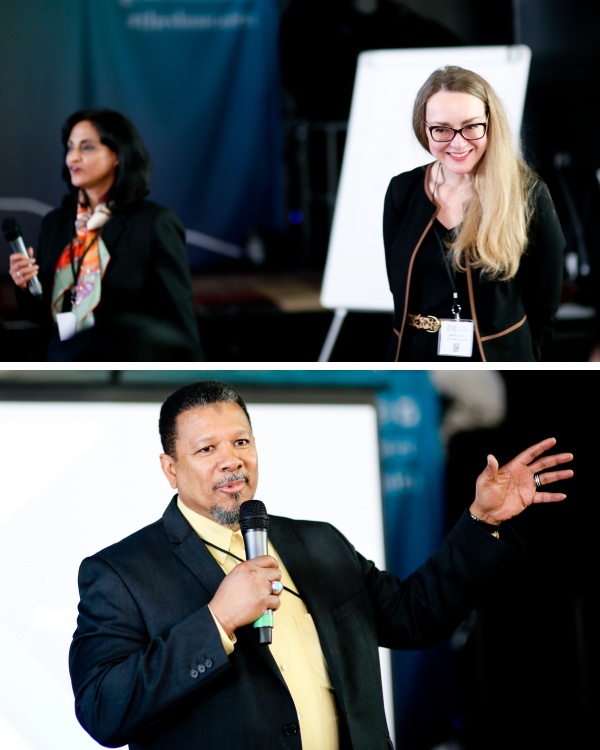
(Top) Dr. Nilufar Choudry (left) and Cat Lockman (Bottom) Imam Dr. Talib Shareef /Photos by Paul Moane
Lockman introduced the focus of the session which was broken into three main modules:
- The role of social media in youth radicalization
- How to build an efficient campaign against terrorism and extremism
- How to build a community-based response
A short video was shown that documented the recent story of the youngest person to be convicted of terrorism, Mohammed Khalid, in the USA. This video illustrated the importance of prevention work. Dr. Nuilifer reiterated the warning signs helpful in identifying individuals vulnerable to the influence of radicalization. There isn’t one profile or one religion that results in terrorism despite common beliefs. However, common symptoms like alienation from family or friends, social withdrawal, and drastic changes in behavior have been found to be symptoms of radicalization.
Social media has been utilized as an effective tool in the recruitment of new members to terrorist groups, as well as a way for violent extremists to receive funds and resources. Yet, this does not mean that social media is our enemy. GPF representatives highlighted that social media can very well be used as a catalyst for positive social change.
Imam Dr. Talib Shareef presented the role and work of the AMATE Initiative. The Federal Bureau of Investigation and Department of Homeland Security saw Dr. Shareef’s large religious community as void of any cases of extremism and asked for their direct help to effectively combat terrorism on a community level.
Along with the request for help, the initiative received a grant to fund four different social media campaigns sparked from relevant focus groups of stakeholders and youth, each challenging the narrative extremists use to radicalize others.
The underlying message of each social media campaign was the importance that the Nation of Islam stands for “Peace” and that the religion should not and does not reflect terrorism.
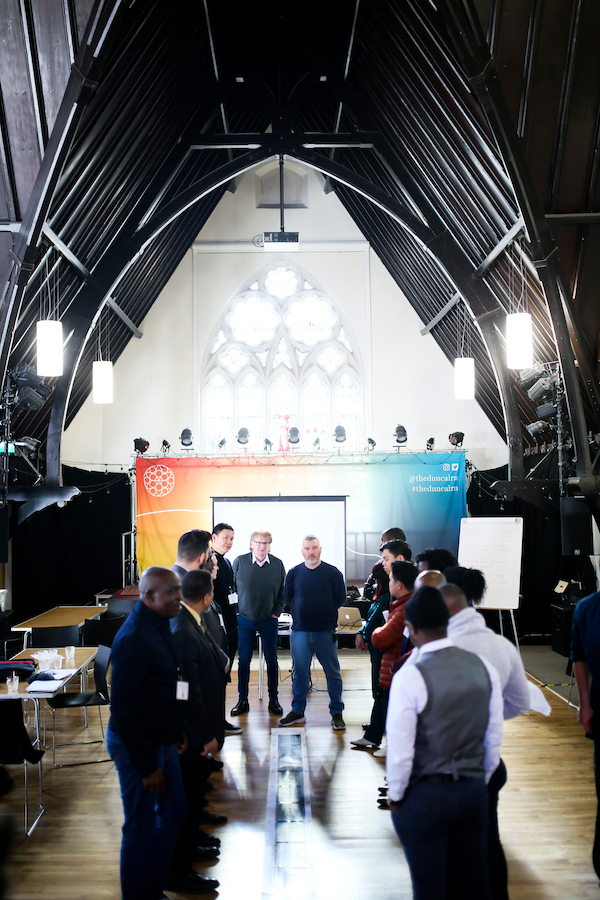
Belfast Peace Learning Program /Photo by Paul Moane
After this presentation, delegates were asked to split into their respective nations and come up with a counter-terrorism campaign that would be efficient in their own countries. The commonalities of each campaign included the importance of getting the community as a whole engaged and to put a supportive focus on the role of youth. The campaigns also aimed to create an inclusive online presence that opposes the beliefs of terrorist or radical groups.
GPF’s Senior Program Specialist, Gail Hambleton, introduced the last module, which focused on interfaith and highlighted the importance of community-based peacebuilding through shared identity. She described how conflicts usually arise from the common misconception of us vs them. Hambleton led this into the concept of shared values and using this approach to build an “us” community with no other opposition because we are able to build relationships on the common values we share with one another.
“How can we live together, and take care of each other?” she asked. “If you look at all the different conflicts around the world, they can be perceived as identity-based conflict,” she said. “Those groups are identified by religion, political background, or ethnic or they are national identity. This is not a quick, nor an easy conversation of what our shared values and common aspirations are.”
Rev. John Joseph Hayab (Chairman Christian Association of Nigeria Kaduna State), Sheikh Hailru Abdullahi Maraya (Islamic Cleric and Former Special Adviser to Kaduna State Governor on Muslim and Hajj matters) spoke on their experience of eliminating conflict in Nigeria and helping guide their communities to look past their differences and to rather focus on their values and needs. Datu Yussef Abubakar M. Paglas (Global Ambassador, International Young Leaders Assembly Youth Affairs Consultant of the Municipality of Datu Paglas, Maguindanao), briefly spoke on the separation of Muslims and Christians in the Philippines. He mentioned how society has overlooked the history of Muslims and how it has created a stronger separation of the two religions. Yet, with the cooperation of the government and the open minds of the people, he has faith that the people can achieve strong and stable peace in the Philippines.
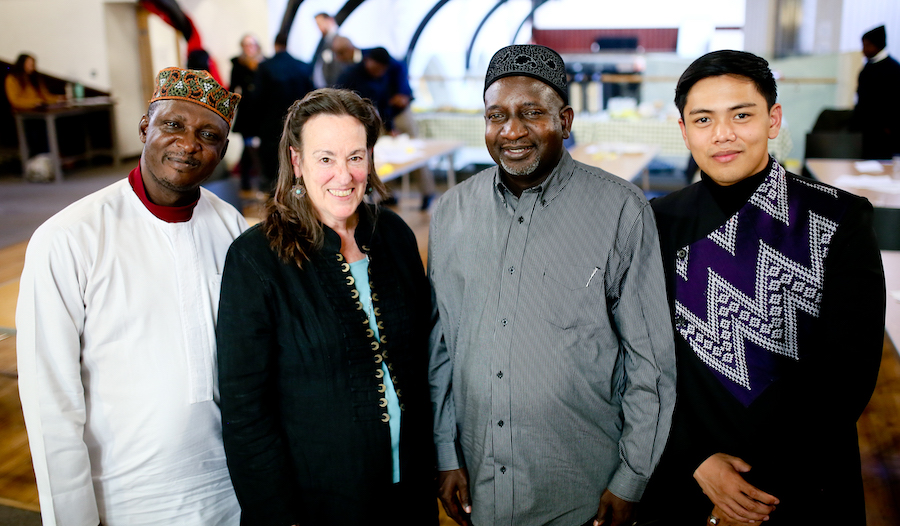
(From left) Rev. John Joseph Hayab, Gail Hambleton, Sheikh Hailru Abdullahi Maraya, and Datu Yussef Abubakar M. Paglas /Photo by Paul Moane
The session ended with suggestions from the various delegations as to how to effectively highlight shared values. Foundational democracy was said to promote social cohesion, as well as maintaining and protecting human rights. To enhance tolerance, it was suggested that individuals seek out an experiential exchange to various religious ceremonies besides their own. The group weighed the importance of building the capacity of leaders, the importance of dialogue with key stakeholders, teachers, practitioners, women’s groups and community leaders on a platform that invites collaboration.
After considering how their personal understanding of the formation of conflict and peace has evolved, the international delegation engaged in a presentation by facilitators from Co-operation Ireland who used a visual of a road spread across the center of the room, tasking the delegates to represent their progression on the continuum as a response to the series of questions.
“Now I’m starting to understand war and peace from the perspective of an educator and businesswoman,” a delegate from the Philippines shared. “I’m changing career paths with a greater understanding of peace and I’m hoping to apply the things I learned here in the future.”
Groups were then formed to look at the case studies of each country’s historic and current conflict. A debrief followed and some shared their main conclusions and considerations.
The United States group discussed concern for the lack of written history of the Native Americans in the United States.
The first step, proposed by the Kenyan delegation, is identifying stories of the past. “First you have to acknowledge that history, you have to acknowledge what happened,” said Abdifath Bule from Kenya. “That is the starting point.”
The program culminated in an International Peacebuilding Forum on February 27, 2019.
